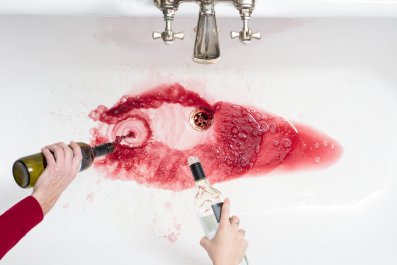My 94-year-old mom is on a mission to clear out her home. "What's going to happen to all these things when I'm gone?" she asks each time I see her.
She's in perfect health and isn't a packrat or a hoarder. Yet whenever one of my siblings or I visit our childhood home, she insists we leave with a tray, bowl, or knick-knack, presenting the item like she is a host on QVC. "Think about how nice this would look in your home," she says, sweeping her hand across the object.
As a former professional organizer for 15 years, I hesitate to bring anything I don't need or want into my home, no matter the skill with which my mom tries to "sell" it. Her willingness to let go of her "stuff" is far different from my past clients who took the opposite approach, unable to part with outdated clothing and mountains of paperwork. "I may need these someday," they'd say, while clutching a box of Beanie Babies.
Many had made resolutions to get organized at the beginning of the year or in response to constant external pressure from others. Initially, their desire to declutter was strong, then quickly dwindled, as did their confidence that they could make even one small change in how they lived. They compared themselves to others, believing they had to get organized to the same degree. Discouraged, they gave up.
I couldn't blame clients for their lack of progress in getting organized on their own, considering their unrealistic belief that creating order out of chaos should come naturally. Paper and electronic file organizing, knowing what to toss and what to keep, and maintaining clear countertops and tables aren't skills that come easily to all.
While society teaches us that we should have a clutter-free home, there are advantages to both organized and disorganized spaces. A study published in Psychological Science suggested that people placed in an organized room chose healthier snacks and donated more money, while people in a disorganized room were more creative.
My clients with unbridled imaginations would have felt stifled working at a clean desk in their home office. The piles of paper, stacks of photos, or fabric samples strewn across a work table inspired them to develop ideas for books, marketing campaigns, or product designs. They thrived on a chaotic workspace.

Despite their family's comments, their disordered environment matched the ideas swirling through their minds. The compromise we usually reached was to utilize open shelving and add clear containers and baskets to store the supplies they needed to access easily.
Forcing someone to change a habit—in this case, disorganization—that they don't see as a problem is as easy as expecting a chocoholic—guilty—to give up a handful of dark chocolate. It's not going to happen automatically or at all, and that's okay.
At the same time, I'm not condoning hoarding. "If someone is hoarding and that person is unable to literally function, that's a different story, and that person then may need to consult with a therapist or someone to get help," says Dr. Lori Davis, a clinical instructor of psychology and psychiatry at Weill Cornell Medical College in New York. "But other than that, it's a person's choice to keep their home the way they want and need to."
When I would meet with a new client, they often felt ashamed about not having created a perfect space or were experiencing anxiety about trying to match the efficient homes of others. They may have borne the brunt of insults, judgment, or snide comments from friends and family to encourage them to make changes.
Dr. Davis recommends a way to deal with the expectations from others to live up to the organizational standard they have set: use clear and emotional language. She gives the example, "I appreciate your concern for me, but this is my home space and I'm really comfortable in it, and when you comment on that, it makes me feel like I'm doing something wrong." She notes that everybody feels an internal sense of pressure that's coming from external places.
Adding to the stress of creating and maintaining a perfect space is the growth of Instagram and TikTok influencers, along with shows such as Tidying Up With Marie Kondo and Get Organized With The Home Edit. It's important to view those videos and shows as inspiration, not a validation of your self-worth.
One segment after another features packed family rooms and basements transformed into livable spaces. The big reveal at the end of each episode, with books lined up by topic or color and pantry shelves lined with clear containers or baskets, can trigger unrealistic expectations that once the space is organized, it will stay that way. In many cases, it won't.
Your level of organization can affect your life and relationships, but it doesn't need to define it. After studying organizing professionals' strategies throughout the shows or videos and struggling to apply them to your home, it's easy to consider yourself a failure. You're not. If going back to a less-than-organized way of living works for you, there's nothing wrong with that.
I'm not suggesting that people give up on learning organizing skills. Consider the old joke, "How do you change a lightbulb? It has to want to change." If someone wants to take control of their clutter, they have to want to stop stepping over piles. They have to reach the point where they're tired of wasting time searching for lost items or spending money replacing something they bought months before but can't find.
My goal as a professional organizer was to simplify my clients' lives, for example by designating a drop-off space near the front door for keys, wallet, and purse and storing similar items together.
We knew there was a chance they would slip and go back to their old ways, but I worked with them to reduce their self-imposed pressure to maintain orderly spaces. I wanted to help them minimize their shame and make room for their transformation. By setting up their home to fit their needs, they were more likely to maintain their level of organization.
Years after selling my business, I still empathize with the clients I met during our initial consultation. They lowered their eyes as mine took in years of magazines piled in corners and closets packed like a Jack-in-the Box, ready to spring open.
Together, we sorted through their possessions to weed out what no longer pleased them and instead induced hurtful comments from others. While some clients asked whether they could leave the decisions to me and come back when I was finished, I explained the importance of working as a team to change the space around them.
I don't regret encouraging clients to live with less and helping them set up individualized systems to save time searching for lost items. One day, when they're downsizing or are finally fed up with the mess, maybe they'll reapply the skills I taught them years ago. Or instead, they'll understand that how you live your life matters more than the items that fill it.
In the meantime, they can always follow my mom's lead and start parting with their possessions during visits from friends and family.
Lisa Kanarek is a Texas-based freelance writer whose work has been published in The New York Times, The Washington Post, WIRED, and Huffington Post. She is an end-of-life doula and part of a therapy animal team with her dog, Gaia.
All views expressed are the author's own.
Do you have a unique experience or personal story to share? See our Reader Submissions Guide and then email the My Turn team at myturn@newsweek.com.










